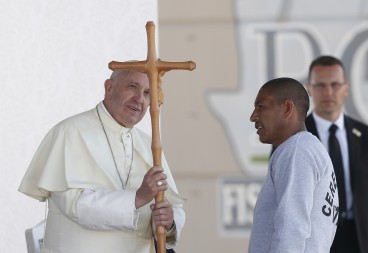November 1, 2016 // Local
YOM: Admonish the sinner, but show love, too
By Daniel S. Mulhall, CNS

Pope Francis accepts a crucifix from a prisoner as he visits Cereso prison in Ciudad Juarez, Mexico, earlier this year. Pope Francis hoped to inspire prisoners to believe that “the power of divine mercy” can make all things new.
When one thinks about the spiritual work of mercy “admonish the sinner,” the picture of John the Baptist in the desert — the fiery prophet we see in Matthew 3:1-10, calling for people to repent their evil ways and to produce good fruit as a sign of repentance — comes to mind.
While Jesus used similar language at times, his approach to dealing with sinners usually took a different track.
The guidance Jesus offers on how to correct someone also appears in Matthew. We are told to “stop judging” and to first correct our own faults before daring to challenge others: “You hypocrite, remove the wooden beam from your eye first; then you will see clearly to remove the splinter from your brother’s eye”(Mt 7:5).
Jesus was known as someone who ate with tax collectors and sinners. When questioned about this seemingly inappropriate behavior, Jesus answered, “Those who are well do not need a physician, but the sick do. I did not come to call the righteous but sinners” (Mk 2:17).
Think also of how Jesus treated someone who was publically recognized as a sinner. In Luke 7:36-50, we hear the story of how a “sinful woman” comes to meet Jesus while “he was at table” in the house of a religious leader. There, she “began to bathe his feet with her tears,” wiped them dry with her hair, “kissed them and anointed them” with oil.
While the religious leader was appalled by this (if Jesus only knew “what sort of woman this is who is touching him”), Jesus only said to the woman that her sins were forgiven and “your faith has saved you; go in peace.”
To the religious leader Jesus said that the woman’s sins had been forgiven because she had shown great love for Him. Jesus goes on to make the point that one who has been healed of a great sickness has great gratitude but that “one to whom little is forgiven, loves little.”
Finally, consider Luke 19:1-10, the story of Zacchaeus, a tax collector and a wealthy man (with the suggestion that his wealth may have been illegally gained). Zacchaeus must have been well-known, because Jesus recognizes him immediately and calls to him, “Zacchaeus, come down quickly, for today I must stay at your house.”
Because of Jesus’ public act of kindness (honoring Zacchaeus when others heaped scorn), Zacchaeus changes his life and makes amends to all he has harmed.
During this Year of Mercy, it is good to remember how Jesus called others to recognize their sinfulness. It is indeed an act of mercy to invite someone to forgiveness and healing, but how we do it can make all the difference in the world.
As the saying goes, loving the person does not mean loving the sin. Jesus showed this through His actions. His kindness led people to accept the gift of mercy he offered.
— Daniel S. Mulhall is a catechist who lives in Laurel, Md., and writes for CNS.
FOOD FOR THOUGHT
Many of us are reluctant to point out a person’s transgressions, let alone sins, making the spiritual work of mercy, the one that tells us to admonish the sinner, difficult to carry out.
But in a series of interviews with Vatican Radio about the works of mercy, Msgr. John Kennedy, from the Vatican’s Congregation for the Doctrine of the Faith, said we have to understand its spirit and to think of it in terms of counsel.
“If we were all completely wise and prudent and knew everything, then we wouldn’t need anybody to give us advice, but this is clearly not the case,” he said.
When we decide to take on this work of mercy, we must do so with the spirit of love and for the good of the person, he said. When we talk about a person who has committed a sin, we’re looking at someone whose actions have damaged “or put in danger perhaps the relationship between that individual and God,” he said.
Sin can distort “how we see and interact with other people,” Msgr. Kennedy said. “The purpose of all this is to show us that sin weakens us, makes us shortsighted … it destroys the peace and the harmony, that really should exist, not only in our own soul, but also within the members of God’s family.”
The best news. Delivered to your inbox.
Subscribe to our mailing list today.






